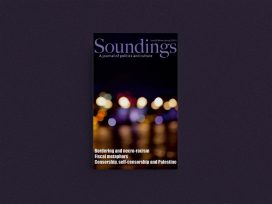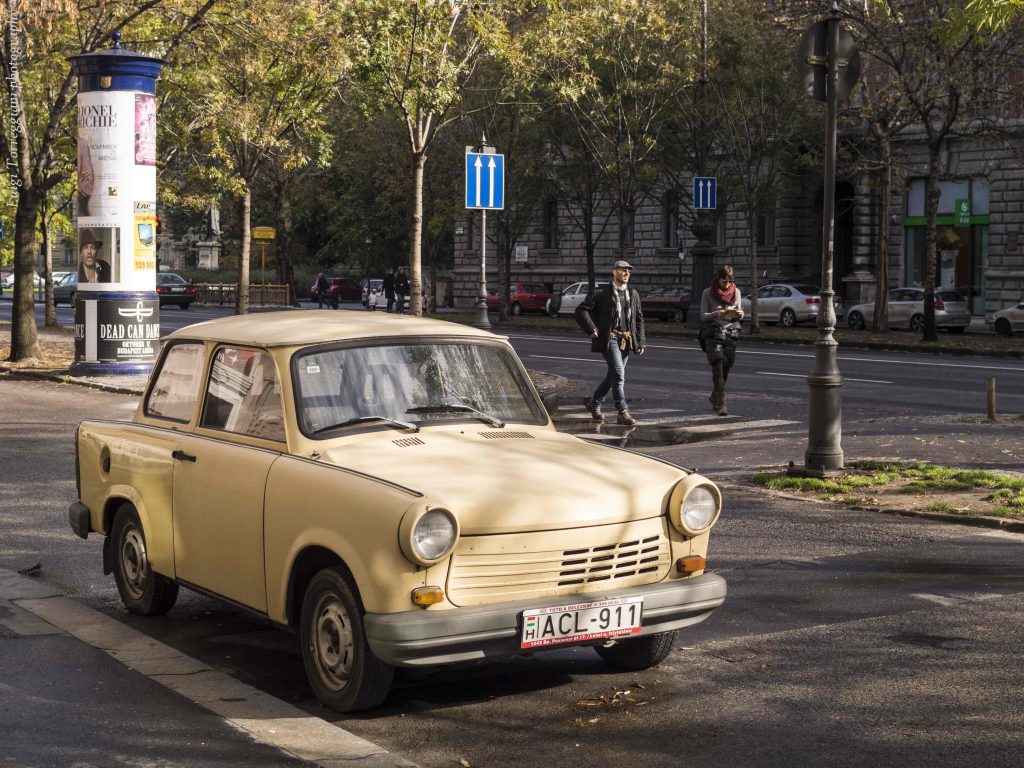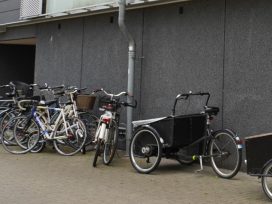
Trust, bordering and necro-racism
Soundings 88 (2024)
How disenchantment with government has fuelled necropolitics; statue mania in the age of empire; and a conversation about censorship, self-censorship and Palestine.
There is a certain type of post-Soviet anxiety that manifests itself in fear of state authorities, border controls or even doormen. The memory of 1989 may have largely faded, but the feeling of being ‘eastern’ has stayed with many – not least those who have built up lives and careers in the West, writes Júlia Sonnevend.
After twelve years living in the United States, I have recently applied for American citizenship. It was a decision about belonging. I will keep my Hungarian citizenship, but after becoming a professor and getting married here, not to speak of giving birth to a US citizen, I finally decided that this ‘American connection’ needed to become official. (Yes, I was also tired of being the only one in the family with a Hungarian passport in the endless immigration lines at US airports.)
As part of the application, I had to participate in a ‘biometrics exam’ in New York. They take your fingerprints and capture a minimally attractive photograph of you, that’s about it. The building, despite being an extensive bureaucratic complex, was actually filled with extremely friendly staff. Everybody was there to help and make me feel welcome. I had to endure an oversized image of President Trump and Vice President Pence and a huge banner announcing that we are securing our borders, but that was about all that signaled policy changes. Officers smiled, shook hands, wanted to chat. Still, I was filled with fear. My regular relative confidence was gone, I was unable to smile, my movements were strangely wooden. I feared every interaction, was overly eager to follow all rules, and could not wait to have this otherwise banal process behind me. My anxiety must have become visible, as the officers began to ask whether I was feeling well. They offered help, joked, handed over water. The photographer said it’s okay to smile. I tried.
I was at a loss why I was behaving that way. Unlike many, I have not had bad experiences with US law enforcement. Being white, I have not suffered systematic exclusion. I ‘only’ observed it. In fact, I was every Republican’s dream of an immigrant, self-made in my academic career, coming from a post-communist country, have never received any state support and was not planning to bring any family members with me either. So why am I so scared in the middle of New York in an environment where everybody has made an extra effort to make me feel welcome?
The East in you never leaves, I thought, after leaving the immigration bureau. Thirty years after the fall of the Berlin Wall, here I was in Manhattan, and felt deeply and fully ‘eastern’. What does that mean for somebody who was only ten years old in 1989, whose memories of communism mostly relate to a monument she loved to climb on Gellért Square in Budapest? Simply put, it means a bodily sensation of inexplicable fear at the border. My deep-rooted anxiety about border-guards and law enforcement was back, even in the country where I have chosen to live; where, despite all the problems the United States now faces, I feel deeply at home. In that sense, your ‘eastern’ identity never leaves you, I thought, not even after three decades.
When entering the US immigration center, I was transported back to the little Trabant of my parents, along with my two brothers, as we were crossing the border from ‘eastern’ Hungary to ‘western’ Austria in the 1980s. Squeezed into the back seat with my much older brothers (how did we even fit in?), my stomach was in knots. My father stopped the car a few minutes before the border and explained the rules. The main rule concerned ‘silence’. You do not chat with the border guard. You do not share this or that detail, no matter how friendly they look. And on the way back, you do not on any account mention the Walkman and other ‘western treasures’ you were bringing home. I was thinking whether I could brag about the chewing gum I collected from those beloved machines on every Austrian street corner. You turn a metal handle, and there it is, a ball-shaped piece of chewing gum; or, if you have a bit more money, a plastic globe with some little toy in. But I did not ask. Let’s be silent and keep the gum! My parents were very cautious, but I do not actually remember any incident with the border guards. Maybe there was, but I have no memories of it. We self-censored. We followed the rules. We complied.

The iconic beige Trabant. Photo source: Wiki commons
Decades later, in the United States, I observed that when older Hungarians visited me in Manhattan, they were afraid of the doormen. Older Hungarian intellectuals were concerned the doormen might stop them or cause some other form of public embarrassment. Even if I explained that I shared the visitors’ names with the doormen, doormen are there to open doors, deliver packages and greet you with a big smile, my visitors remained deeply sceptical. These Hungarian friends preferred me to come down and pick them up, just in case. They visibly sighed with relief once we entered the elevator. I sometimes laughed at their requests, thinking of our sweetheart Puerto Rican doorman, but deep inside I thought: well, there just seem to be levels of eastern-ness. They simply had a much stronger sense of the ‘East’ in their bodies than I do.
Thirty years after 1989, the traditional East-West divide of my childhood has in many ways disappeared. In a book entitled Stories Without Borders (in Hungarian, Határok nélkül) that I recently published about the fall of the Berlin Wall, I started a chapter stating that ‘East Germany and the Soviet Union have disappeared from the world map, contemporary societies are grappling with new global conflicts, and the Berlin Wall exists only in our memories.’ The chapter deals with memorials of the fall of the Berlin Wall and how the custodians of memory are desperately trying to keep this event in the global imagination through performances, exhibitions, protests and commemorations. I described their passionate fight against the powerful forces of social forgetting, both dangerous and beneficial.
Events need substantial narrative effort in order to remain alive. Most simply sink into the sea of forgetting. But even if the memory of 1989 has largely faded, the feeling of being ‘eastern’ has stayed with many of us. It’s there in our thoughts, movements, fears and desires. It’s there in our choice of partners, in the songs we sing to our children and our behavior in our workplaces. It’s part of our flesh and bones. Some of these experiences are inexplicable to new generations, because they are connected to particular sites, a Communist memorial or the personality of a certain school director.
But much of being ‘eastern’ is quite easily translatable across generations – or at least that is my experience from teaching. When I mention the ‘Berlin Wall’ to my undergraduate students at the New School for Social Research in New York, or at the University of Michigan in Ann Arbor, there is first silence and confusion. Some of them heard of it, but have no idea which countries it divided. Others do not have the faintest idea that it has ever existed. Some well-traveled, affluent students beam with pride that they happened to see it on a recent trip. But all of them have a truly hard time connecting to it. They simply do not know where to place it; it is part of some vague imagination they have of the Cold War, a confusing, old and largely meaningless history they have to learn about, but do not feel in their bones. Until I start to speak about walls and barriers internationally. Or the power of division that comes to shape the lives of generations. When I speak about physical or virtual separation and the lasting pain it causes, my students are ‘right there’ with me.
What does this all tell us about East and West after 1989? It tells us something about the power of generations. The iconic event of one generation may be no more than a dusty object for another. The East–West divide of one generation is an incomprehensible division to another. East and West, in the Cold War sense of the terms, mean nothing to my students. But if you use these terms in a broader, more metaphorical sense, my students’ lives are all about divisions. They graduate with massive student debt and have to succeed in a very competitive global work environment. These students understand the symbolic power of walls perhaps more than any generation beforehand. They witnessed the 2016 campaign, when building a border wall was the popular slogan of the successful presidential candidate, not something to be ashamed of. They live in a world that has more separation barriers than there were in 1989, and have experienced two waves of frantic, international wall-building; after the September 11 attacks and since the 2015 refugee crisis. They know everything one can know about ‘being’ and ‘feeling’ eastern. Some of them even have similar reactions to borders as I have. We may not connect through the historical story of the Berlin Wall, but we do connect through a powerful understanding of division, separation, and inequality.
When I came to the United States, I truly and fully wanted to leave my ‘eastern-ness’ behind. For a long time, I was annoyed by my Hungarian accent. I regarded it as a life-long stigma, a permanent mark of being ‘alien’. (The US immigration rules of calling me first a ‘nonresident alien’, then a ‘resident alien’ were quite accurate, I thought.) I did not write my first book on a Hungarian topic, and was quite offended when mentors raised the possibility that perhaps I should write more about my ‘home country’. I wanted to compete on equal grounds, not as an ‘international student’ writing about ‘her country of origin’. It has only been in recent years, from the relative safety of a tenure-track academic job, that I started to relax about being eastern. I occasionally even write about this division, and about Hungary, although it took me some time to decide whether I really want to rethink ‘East and West thirty years after 1989’. It seemed like an awfully hard therapy session, soul-searching on steroids. But it’s impossible to avoid this process of soul-searching, no matter how hard you try.
More than anything else, having a baby son makes me think hard and deep every single day about what it means to be ‘eastern’ or ‘western.’ What does it mean to raise a bilingual, Hungarian-American child in in New York in the twenty-first century? Will he have something ‘eastern’ in him as he carries his American and Hungarian passports around the world? Going to school in the United States, I have no doubt that he will be predominantly American, deeply western according to my old conceptions (even though I work hard to teach him Hungarian language and culture). But will he be able to understand Mommy’s weird, confusing eastern past? While walking on the streets of Budapest, will he ever think of ‘East and West’? Will he ever worry when he crosses a European border? I do not know. And in some ways, I perhaps do not even care – as long as he remains happy.
Published 11 March 2019
Original in English
First published by Eurozine
© Júlia Sonnevend / Eurozine
PDF/PRINTSubscribe to know what’s worth thinking about.

How disenchantment with government has fuelled necropolitics; statue mania in the age of empire; and a conversation about censorship, self-censorship and Palestine.

Denmark’s neglected areas of urban social housing are up for regeneration. But Copenhagen’s demographic diversification plans threaten to ostracize the very communities ghettoized within the city’s ‘imaginary borders’ – immigrants fear expulsion at the hands of gentrification.